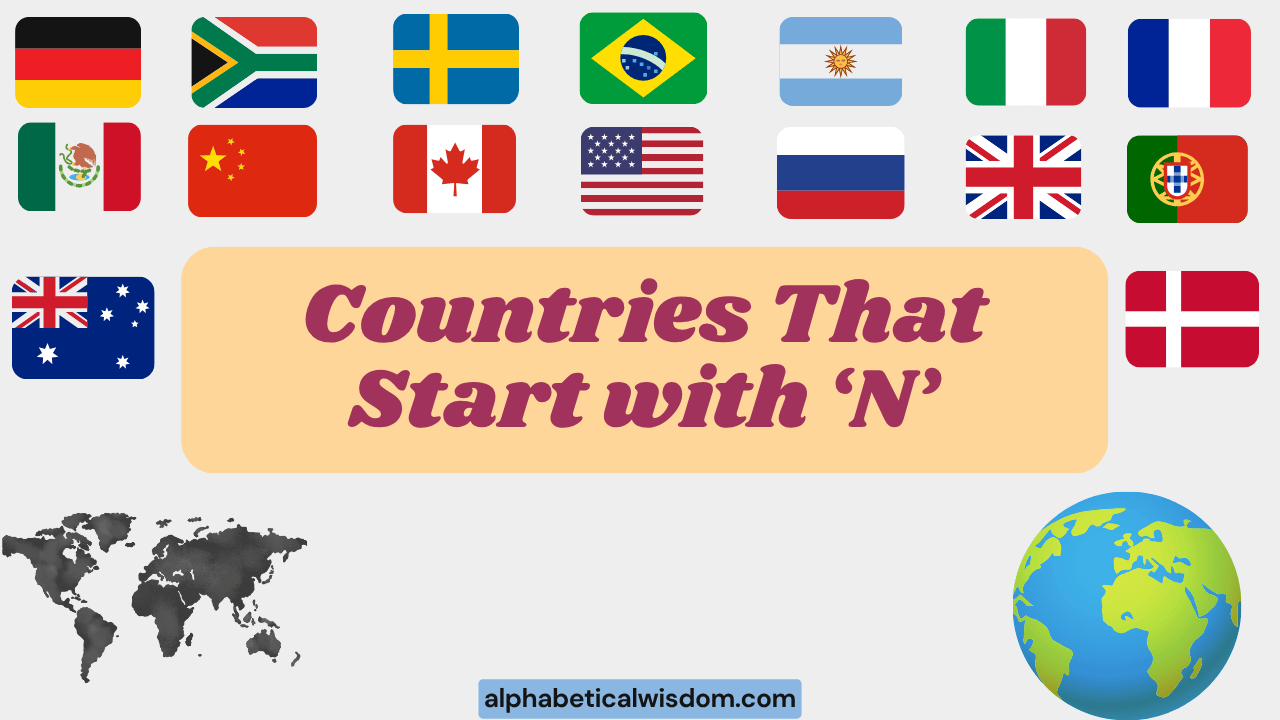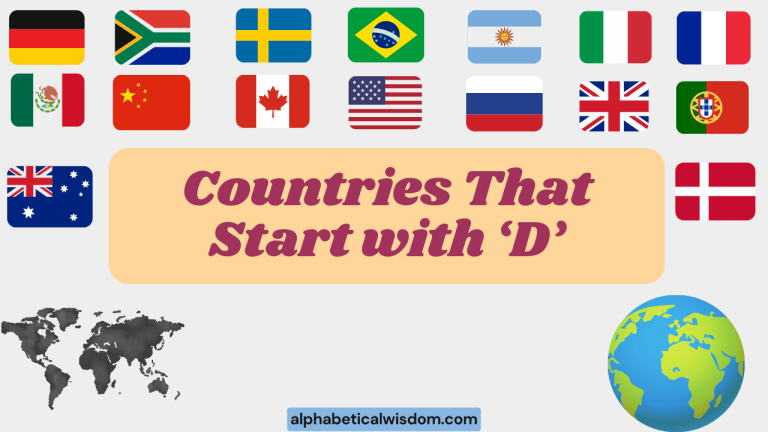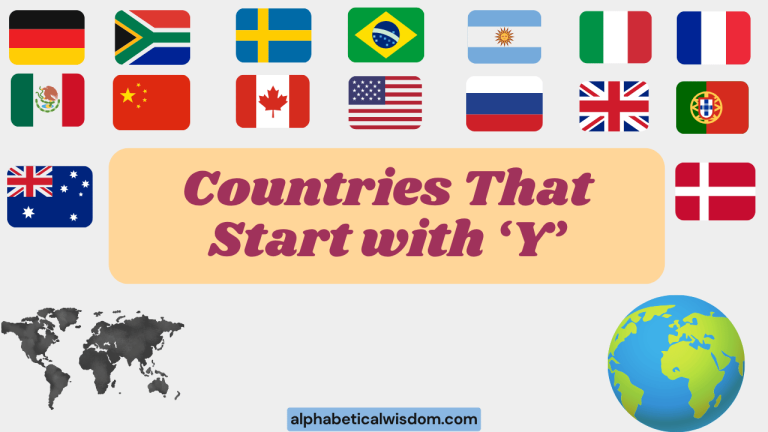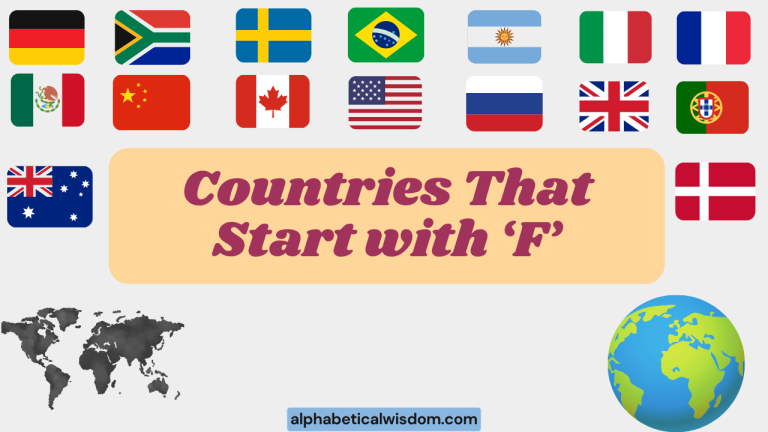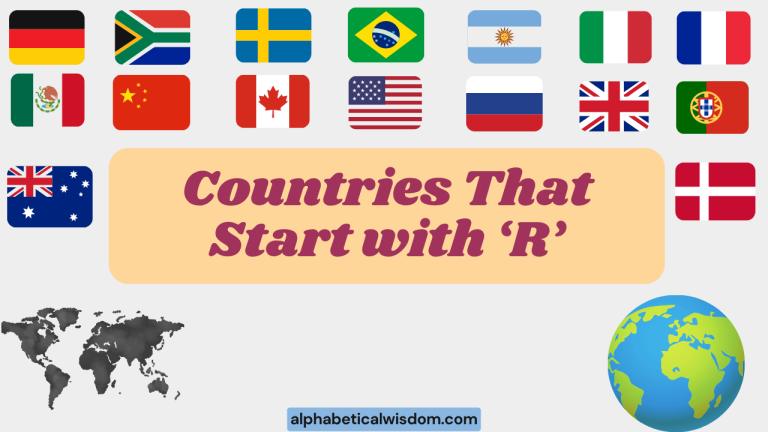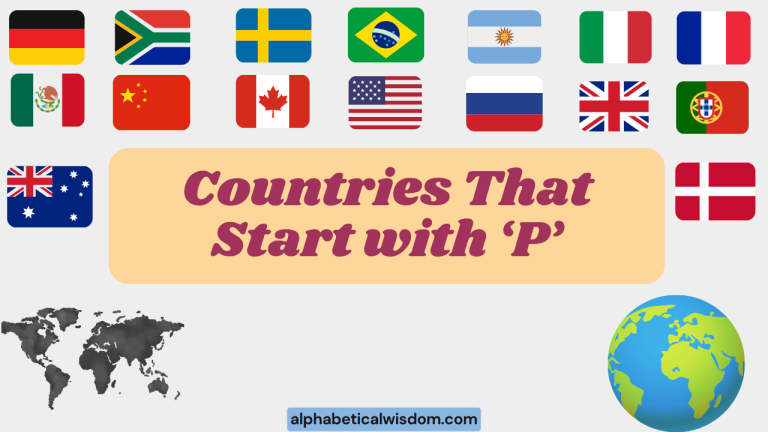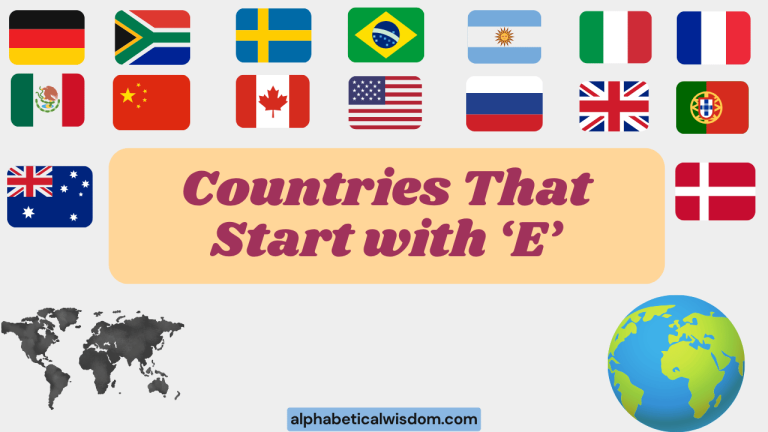Countries Starting With ‘N’: A Comprehensive Grammar Guide
Understanding how to correctly use country names, particularly those starting with the letter ‘N’, is crucial for effective communication in English. This article provides a detailed exploration of the grammar rules and conventions associated with these countries, covering everything from capitalization and article usage to common mistakes and advanced topics.
Whether you’re an ESL learner, a student of linguistics, or simply looking to improve your English proficiency, this guide will equip you with the knowledge and skills to confidently navigate the nuances of using countries that start with ‘N’ in your speech and writing.
This guide is designed to be accessible to learners of all levels, from beginners to advanced speakers. By breaking down complex concepts into manageable parts and providing numerous examples and practice exercises, we aim to make the learning process engaging and effective.
So, let’s embark on this grammatical journey and master the art of using countries starting with ‘N’ with precision and accuracy.
Table of Contents
- Introduction
- Definition: Countries Starting With ‘N’
- Structural Breakdown
- Types and Categories
- Examples
- Usage Rules
- Common Mistakes
- Practice Exercises
- Advanced Topics
- FAQ
- Conclusion
Definition: Countries Starting With ‘N’
A country, in the context of this article, refers to a politically defined territory with its own government, population, and sovereignty. When we talk about “Countries Starting With ‘N’,” we’re specifically referring to those sovereign states whose official English names begin with the letter ‘N’.
These names function as proper nouns, requiring specific grammatical treatment in English sentences.
The function of these country names in English grammar is primarily as nouns. They can serve as subjects, objects, complements, or appositives within a sentence.
They often require capitalization and may occasionally be used with articles or prepositions depending on the context. Understanding their grammatical role is essential for constructing grammatically correct and meaningful sentences.
The context in which these country names are used can vary widely, ranging from casual conversation to formal writing, academic research, and journalistic reports. The specific grammatical rules and conventions that apply may differ slightly depending on the context.
For example, more formal settings may require greater attention to detail and adherence to strict grammatical rules.
Structural Breakdown
The structural breakdown of phrases involving countries that start with ‘N’ involves several key elements. First, the country name itself is a proper noun and must be capitalized. Second, the use of articles (a, an, the) depends on the specific country name and the context of the sentence. Some country names are typically used with the definite article “the,” while others are not.
Third, prepositions play a crucial role in indicating the relationship between the country name and other elements in the sentence. Common prepositions used with country names include in, to, from, of, and with. The choice of preposition depends on the intended meaning and the grammatical structure of the sentence. For example, “I live in Norway” indicates location, while “I traveled to Namibia” indicates destination.
Fourth, adjective forms derived from country names are used to describe people, things, or concepts associated with that country. These adjective forms are often created by adding suffixes such as -an, -ian, or -ese to the country name. For example, the adjective form of “Norway” is “Norwegian,” and the adjective form of “Namibia” is “Namibian.” These adjective forms modify nouns and provide additional information about their origin or characteristics.
Types and Categories
Countries starting with ‘N’ can be categorized geographically, politically, or culturally. Geographically, they can be classified by their continent, region, or climate.
Politically, they can be categorized by their form of government, their membership in international organizations, or their political alliances. Culturally, they can be classified by their language, religion, or customs.
From a grammatical perspective, these countries can be categorized based on whether their names typically require the use of the definite article “the.” Some country names, such as “the Netherlands,” are almost always used with “the,” while others, such as “Norway” and “Namibia,” are typically used without an article. This distinction is important for ensuring grammatical correctness and clarity in writing and speech.
Another categorization can be based on the formation of their adjective forms. As mentioned earlier, different suffixes are used to create adjective forms from country names.
Understanding these patterns can help learners correctly form and use adjective forms in their writing and speech. For example, knowing that the suffix “-ian” is commonly used for countries ending in “-ia” can help learners correctly form the adjective form of “Namibia” as “Namibian.”
Examples
General Usage
This section provides general examples of how countries starting with ‘N’ are used in sentences. These examples cover a range of grammatical contexts, including subject, object, and complement positions.
The following table provides 30 examples of countries starting with ‘N’ used in various sentences:
| # | Sentence |
|---|---|
| 1 | Norway is known for its fjords. |
| 2 | I want to travel to Namibia next year. |
| 3 | The capital of Nepal is Kathmandu. |
| 4 | She is from New Zealand. |
| 5 | Nicaragua is a beautiful country in Central America. |
| 6 | He works in Nigeria. |
| 7 | They visited the Netherlands last summer. |
| 8 | The culture of North Korea is very isolated. |
| 9 | North Macedonia recently changed its name. |
| 10 | I have never been to Nauru. |
| 11 | Norway has a high standard of living. |
| 12 | The wildlife in Namibia is incredible. |
| 13 | Nepal is famous for Mount Everest. |
| 14 | New Zealand is known for its stunning landscapes. |
| 15 | Nicaragua produces excellent coffee. |
| 16 | Nigeria is the most populous country in Africa. |
| 17 | The Netherlands is famous for its tulips. |
| 18 | North Korea is a communist state. |
| 19 | North Macedonia is located in the Balkans. |
| 20 | Nauru is a small island nation. |
| 21 | The economy of Norway relies heavily on oil. |
| 22 | Conservation efforts in Namibia are crucial. |
| 23 | Tourism in Nepal is a major industry. |
| 24 | Rugby is very popular in New Zealand. |
| 25 | The political situation in Nicaragua is complex. |
| 26 | The film industry in Nigeria is booming. |
| 27 | The Netherlands has a rich history of art. |
| 28 | Information from North Korea is heavily controlled. |
| 29 | North Macedonia is working to join the EU. |
| 30 | The phosphate reserves in Nauru are almost depleted. |
Adjective Forms
This section focuses on the adjective forms of countries starting with ‘N’. These adjectives are used to describe people, things, or concepts associated with those countries.
The following table provides 25 examples of countries starting with ‘N’ and their corresponding adjective forms used in sentences:
| # | Country | Adjective Form | Sentence |
|---|---|---|---|
| 1 | Norway | Norwegian | She speaks fluent Norwegian. |
| 2 | Namibia | Namibian | He is a Namibian citizen. |
| 3 | Nepal | Nepali | I love Nepali food. |
| 4 | New Zealand | New Zealander | She is a New Zealander artist. |
| 5 | Nicaragua | Nicaraguan | They sell Nicaraguan cigars. |
| 6 | Nigeria | Nigerian | He is a Nigerian doctor. |
| 7 | The Netherlands | Dutch | She speaks Dutch fluently. |
| 8 | North Korea | North Korean | The North Korean government is very secretive. |
| 9 | North Macedonia | North Macedonian | He is a North Macedonian writer. |
| 10 | Nauru | Nauruan | The Nauruan culture is unique. |
| 11 | Norway | Norwegian | The Norwegian economy is strong. |
| 12 | Namibia | Namibian | Namibian wildlife is diverse. |
| 13 | Nepal | Nepali | Nepali music is beautiful. |
| 14 | New Zealand | New Zealander | New Zealander rugby is world-renowned. |
| 15 | Nicaragua | Nicaraguan | Nicaraguan coffee is highly sought after. |
| 16 | Nigeria | Nigerian | Nigerian films are gaining popularity. |
| 17 | The Netherlands | Dutch | Dutch design is iconic. |
| 18 | North Korea | North Korean | North Korean art is rarely seen outside the country. |
| 19 | North Macedonia | North Macedonian | North Macedonian cuisine is delicious. |
| 20 | Nauru | Nauruan | Nauruan traditions are fading. |
| 21 | Norway | Norwegian | She is studying Norwegian literature. |
| 22 | Namibia | Namibian | The Namibian desert is breathtaking. |
| 23 | Nepal | Nepali | He is learning to speak Nepali. |
| 24 | New Zealand | New Zealander | The New Zealander accent is distinctive. |
| 25 | Nicaragua | Nicaraguan | She bought a Nicaraguan hammock. |
Common Phrases
This section provides examples of common phrases that use countries starting with ‘N’. These phrases often appear in everyday conversation and writing.
The following table provides 20 examples of common phrases using countries that start with ‘N’:
| # | Phrase | Example Sentence |
|---|---|---|
| 1 | Made in Norway | This sweater is made in Norway. |
| 2 | From Namibia | He is from Namibia. |
| 3 | The mountains of Nepal | We trekked through the mountains of Nepal. |
| 4 | A New Zealander | She is a New Zealander living abroad. |
| 5 | Nicaraguan coffee | I enjoy a cup of Nicaraguan coffee every morning. |
| 6 | Nigerian culture | He is fascinated by Nigerian culture. |
| 7 | The canals of the Netherlands | We strolled along the canals of the Netherlands. |
| 8 | North Korean border | The North Korean border is heavily guarded. |
| 9 | North Macedonian history | She is researching North Macedonian history. |
| 10 | The island of Nauru | He visited the island of Nauru. |
| 11 | Living in Norway | She enjoys living in Norway. |
| 12 | Traveling to Namibia | They are traveling to Namibia for a safari. |
| 13 | Climbing in Nepal | He is experienced in climbing in Nepal. |
| 14 | Visiting New Zealand | We are visiting New Zealand next year. |
| 15 | Exploring Nicaragua | They are exploring Nicaragua‘s rainforests. |
| 16 | Working in Nigeria | She is working in Nigeria as a teacher. |
| 17 | Studying in the Netherlands | He is studying in the Netherlands. |
| 18 | News from North Korea | It is difficult to get accurate news from North Korea. |
| 19 | The people of North Macedonia | He admires the people of North Macedonia. |
| 20 | The economy of Nauru | The economy of Nauru is struggling. |
Usage Rules
Capitalization
The most fundamental rule is that country names, being proper nouns, must always be capitalized. This applies regardless of where they appear in a sentence – whether at the beginning, middle, or end.
Capitalization distinguishes them from common nouns and ensures clarity. For example, writing “norway” instead of “Norway” is grammatically incorrect.
Adjective forms derived from country names are also typically capitalized. Thus, “Norwegian” is capitalized, just like “Norway.” This rule extends to other related terms like “Dutch” (from the Netherlands) and “Nepali” (from Nepal).
Consistency in capitalization is essential for maintaining a professional and grammatically sound writing style.
Article Usage
The use of articles (a, an, the) with country names can be tricky. Most country names do not require an article. For example, we say “I live in Norway,” not “I live in the Norway.” Similarly, we say “She is from Namibia,” not “She is from the Namibia.” However, there are exceptions.
Some country names, particularly those that are plural or include words like “Republic,” “Kingdom,” or “States,” often require the definite article “the.” A prime example is “the Netherlands.” We always say “the Netherlands,” not just “Netherlands.” Other examples include “the United States,” “the United Kingdom,” and “the Czech Republic” (though “Czechia” without “the” is becoming increasingly common). Understanding these exceptions is crucial for avoiding grammatical errors.
Prepositions
The choice of preposition depends on the context of the sentence. The preposition in is used to indicate location within a country. For example, “I live in Norway” or “She works in Nigeria.” The preposition to is used to indicate movement or direction towards a country. For example, “I am traveling to Namibia” or “He is moving to New Zealand.”
The preposition from is used to indicate origin or departure from a country. For example, “She is from Nepal” or “He returned from the Netherlands.” The preposition of is used to indicate possession or association. For example, “the mountains of Nepal” or “the culture of Nigeria.” The preposition with can be used to indicate association or cooperation. For example, “Norway is cooperating with other Scandinavian countries.”
Common Mistakes
One common mistake is failing to capitalize country names. For example, writing “i want to visit norway” instead of “I want to visit Norway” is incorrect.
Another frequent error is using the wrong article or omitting it altogether. For example, saying “I live in Netherlands” instead of “I live in the Netherlands” is a common mistake.
Similarly, saying “She is from the Norway” instead of “She is from Norway” is also incorrect.
Another common mistake is using the wrong preposition. For example, saying “I am going at Norway” instead of “I am going to Norway” is incorrect.
Using the incorrect adjective form is also a frequent error. For example, saying “She is a Dutchian citizen” instead of “She is a Dutch citizen” is a common mistake, as is saying “He enjoys Nepalian food” instead of “He enjoys Nepali food.”
Here’s a table illustrating common mistakes with corrections:
| Incorrect | Correct |
|---|---|
| i want to visit norway | I want to visit Norway. |
| I live in Netherlands. | I live in the Netherlands. |
| She is from the Norway. | She is from Norway. |
| I am going at Norway. | I am going to Norway. |
| She is a Dutchian citizen. | She is a Dutch citizen. |
| He enjoys Nepalian food. | He enjoys Nepali food. |
| He travel to the Namibia. | He traveled to Namibia. |
| She studies Norweigan in Oslo. | She studies Norwegian in Oslo. |
| They are from New Zeland. | They are from New Zealand. |
| The capital of Nepal is Katmandu. | The capital of Nepal is Kathmandu. |
Practice Exercises
Exercise 1: Fill in the Blanks
Fill in the blanks with the correct country name starting with ‘N’.
| # | Question | Answer |
|---|---|---|
| 1 | The capital of _______ is Oslo. | Norway |
| 2 | Windhoek is the capital of _______. | Namibia |
| 3 | Mount Everest is located in _______. | Nepal |
| 4 | Auckland is a major city in _______. | New Zealand |
| 5 | Managua is the capital of _______. | Nicaragua |
| 6 | Lagos is a large city in _______. | Nigeria |
| 7 | Amsterdam is the capital of _______ | the Netherlands |
| 8 | Pyongyang is the capital of _______. | North Korea |
| 9 | Skopje is the capital of _______. | North Macedonia |
| 10 | _______ is a small island nation in Micronesia. | Nauru |
Exercise 2: Error Correction
Identify and correct the errors in the following sentences.
| # | Incorrect Sentence | Correct Sentence |
|---|---|---|
| 1 | I want to travel to the Norway. | I want to travel to Norway. |
| 2 | She is from namibia. | She is from Namibia. |
| 3 | He speaks dutchian. | He speaks Dutch. |
| 4 | They live in netherlands. | They live in the Netherlands. |
| 5 | The capital of nepal is Katmandu. | The capital of Nepal is Kathmandu. |
| 6 | She is a new zealander doctor. | She is a New Zealander doctor. |
| 7 | I bought a nicaraguan coffee. | I bought Nicaraguan coffee. |
| 8 | He is working at Nigeria. | He is working in Nigeria. |
| 9 | The north korean border is closed. | The North Korean border is closed. |
| 10 | Nauru’s economy is small. | Nauru’s economy is small. |
Exercise 3: Sentence Construction
Construct a sentence using the given country name and adjective form.
| # | Country | Adjective Form | Sentence |
|---|---|---|---|
| 1 | Norway | Norwegian | She is studying Norwegian history at the university. |
| 2 | Namibia | Namibian | The Namibian desert is one of the oldest in the world. |
| 3 | Nepal | Nepali | He is learning to speak Nepali before his trek. |
| 4 | New Zealand | New Zealander | The New Zealander team won the rugby match. |
| 5 | Nicaragua | Nicaraguan | I prefer Nicaraguan coffee beans for their rich flavor. |
| 6 | Nigeria | Nigerian | The Nigerian film industry is rapidly growing. |
| 7 | The Netherlands | Dutch | She is a Dutch artist known for her landscape paintings. |
| 8 | North Korea | North Korean | Getting information from North Korean sources is difficult. |
| 9 | North Macedonia | North Macedonian | He is researching North Macedonian folklore. |
| 10 | Nauru | Nauruan | The Nauruan language is spoken by a small population. |
Advanced Topics
Historical Context
The historical context of country names can significantly impact their usage. For example, understanding the historical relationship between the Netherlands and its former colonies can provide insight into the cultural and linguistic influences present in those regions.
Similarly, knowing the history of North and South Korea can help one understand the political and social complexities of the Korean peninsula.
Changes in country names over time also reflect historical and political shifts. For example, North Macedonia was formerly known as the Republic of Macedonia, but changed its name to resolve a dispute with Greece.
Understanding these historical changes is crucial for interpreting historical texts and understanding current geopolitical dynamics.
Political Nuances
The political context in which country names are used can also influence their grammatical treatment. For example, referring to North Korea requires sensitivity due to the country’s controversial political status.
Similarly, discussions about political issues in Nigeria or Nicaragua may require careful consideration of different perspectives and viewpoints.
The use of country names in international relations and diplomacy also involves specific protocols and conventions. For example, official documents and treaties must adhere to strict naming conventions to ensure clarity and avoid misunderstandings.
Understanding these political nuances is essential for effective communication in international contexts.
FAQ
-
Why is it important to capitalize country names?
Capitalizing country names is essential because they are proper nouns. Proper nouns refer to specific, unique entities, and capitalization distinguishes them from common nouns. This distinction is crucial for clarity and grammatical correctness. Failing to capitalize country names can lead to confusion and a perception of carelessness in writing.
-
When should I use the article “the” before a country name?
Generally, most country names do not require the article “the.” However, some exceptions exist. Country names that are plural (e.g., the Netherlands), include words like “Republic,” “Kingdom,” or “States” (e.g., the Czech Republic, the United Kingdom, the United States), or are part of a longer, descriptive name (e.g., the Democratic Republic of Congo) often require “the.” It’s best to check a reliable grammar resource or dictionary if you’re unsure.
-
How do I form the adjective form of a country name?
The adjective form of a country name is typically formed by adding a suffix such as “-an,” “-ian,” “-ese,” or “-i” to the country name. For example, “Norway” becomes “Norwegian,” “Namibia” becomes “Namibian,” and “Nepal” becomes “Nepali.” However, there are exceptions and irregular forms (e.g., “the Netherlands” becomes “Dutch”), so it’s important to consult a dictionary or grammar guide.
-
What prepositions are commonly used with country names?
Common prepositions used with country names include “in,” “to,” “from,” “of,” and “with.” “In” indicates location (e.g., “I live in Norway”). “To” indicates movement (e.g., “I am traveling to Namibia”). “From” indicates origin (e.g., “She is from Nepal”). “Of” indicates possession or association (e.g., “the mountains of Nepal”). “With” indicates association or cooperation (e.g., “Norway is cooperating with other countries”).
-
What are some common mistakes to avoid when using country names?
Common mistakes include failing to capitalize country names, using the wrong article (or omitting it), using the wrong preposition, and using the incorrect adjective form. Always double-check your capitalization, article usage, preposition choice, and adjective forms to avoid these errors.
-
Are there any country names starting with ‘N’ that are often confused?
Yes, North Korea and South Korea are often confused, especially in discussions about politics or current events. Similarly, North Macedonia can be confused with just Macedonia, its former name, which can still be used informally but is not the official name. Understanding the political contexts is key to using these names correctly.
-
How do political changes affect the use of country names?
Political changes can significantly impact the use of country names. For example, when a country changes its name (like North Macedonia did), it’s crucial to use the new name in formal contexts. Additionally, political situations can influence how we refer to a country, especially when discussing sensitive topics or international relations.
-
Where can I find reliable information about the correct usage of country names?
Reliable sources include reputable dictionaries (such as Merriam-Webster or Oxford), grammar guides (such as the Chicago Manual of Style or the AP Stylebook), and official websites of international organizations (such as the United Nations). These resources provide accurate and up-to-date information on the correct usage of country names and related grammatical rules.
-
Why do some countries have longer names that include phrases like “Republic of” or “Kingdom of”?
These longer names often reflect the country’s political structure or historical context. For example, “Republic of” indicates that the country is a republic, while “Kingdom of” indicates that it is a monarchy. These prefixes are essential parts of the official name and should be included in formal writing.
-
Is it ever acceptable to abbreviate country names?
Yes, it is sometimes acceptable to abbreviate country names, especially in informal contexts or when space is limited (e.g., in tables or charts). However, it’s important to use widely recognized abbreviations (e.g., USA for the United States) and to avoid ambiguity. In formal writing, it’s generally best to use the full country name.
Conclusion
Mastering the grammar of countries starting with ‘N’ involves understanding capitalization rules, article usage, preposition selection, and adjective formation. By paying attention to these details and avoiding common mistakes, you can improve the clarity and accuracy of your English writing and speech.
Remember that country names are proper nouns and require capitalization. Be mindful of article usage, especially with countries like the Netherlands.
Continue practicing with different sentences and contexts to solidify your understanding. Pay attention to how native speakers use these country names in their speech and writing.
Review the examples and practice exercises provided in this guide regularly. By consistently applying these principles, you can confidently and correctly use countries starting with ‘N’ in your communication.
Ultimately, correct grammar enhances your credibility and ensures that your message is understood clearly. Whether you are writing a formal report
Ultimately, correct grammar enhances your credibility and ensures that your message is understood clearly. Whether you are writing a formal report, engaging in casual conversation, or communicating in a professional setting, mastering the nuances of English grammar, including the correct usage of country names, is essential for effective communication.
Therefore, take the time to learn and apply the rules and guidelines outlined in this comprehensive guide. Your efforts will undoubtedly pay off in improved communication skills and greater confidence in your ability to use English accurately and effectively.
Keep practicing, keep learning, and continue to refine your understanding of these grammatical principles. Good luck!
